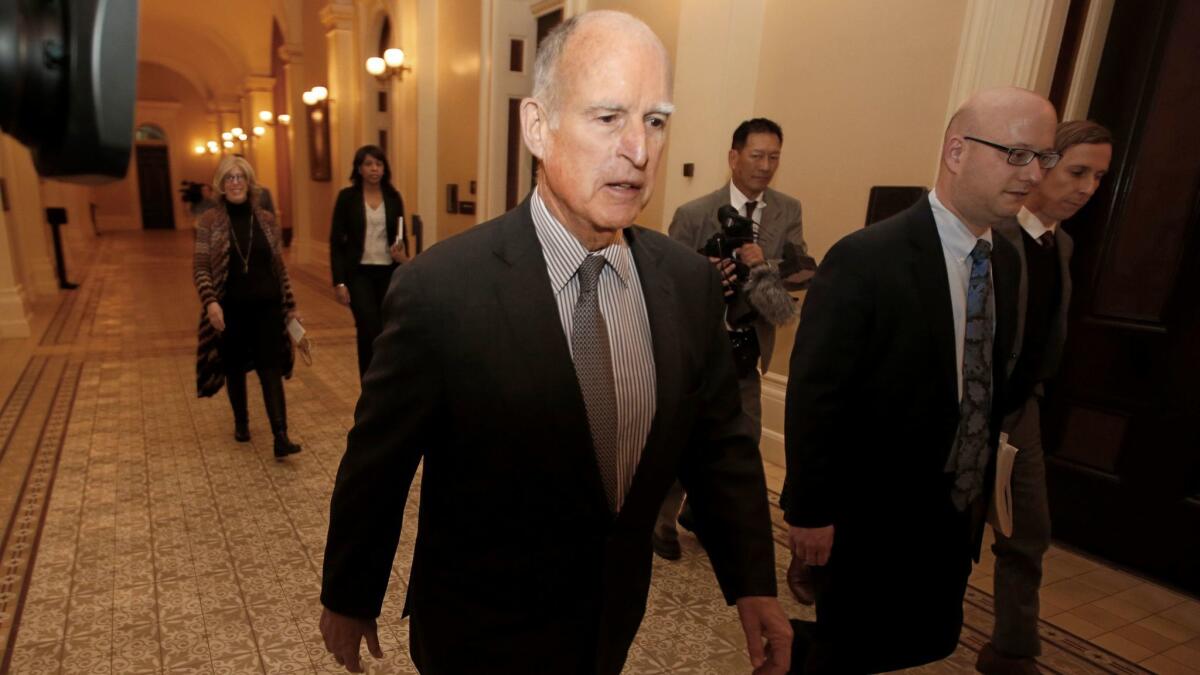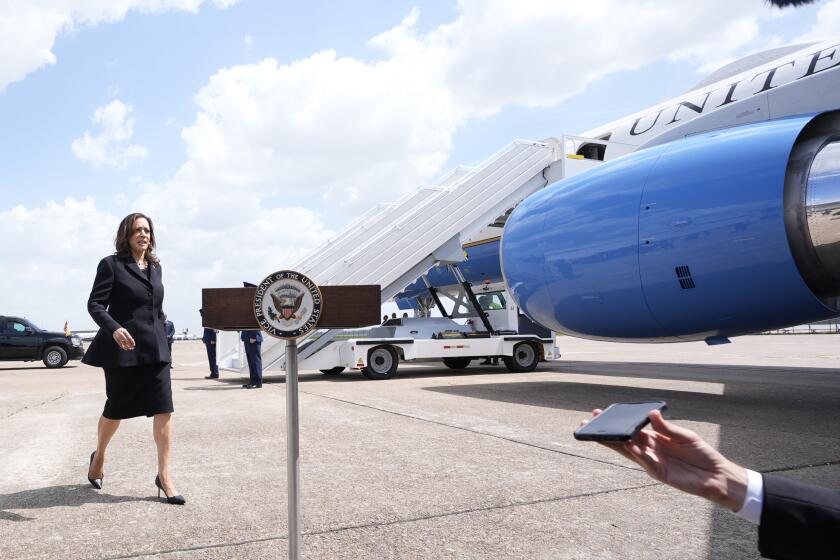Capitol Journal: Was Gov. Brown wrong to make side deals to push through the gas tax hike? No, that’s democracy

Among the most abused words in politics are “corrupt,” “bribery” and “graft.” And they’ve been bellowed a lot lately since the California Legislature voted to raise gas taxes to fix shabby roads.
Those pejoratives, of course, mean different things to different people in different situations.
“There’s illegal corruption, which is incredibly difficult to prove,” says Jessica Levinson, a Loyola Law School professor who specializes in politics and is president of the Los Angeles Ethics Commission. “Then there’s personal corruption that happens every day.”
Having watched garden-variety political corruption for decades, it’s pretty clear to me that the primary test is this: If you like what the Legislature did, it resulted from competence. If not, the legislative process was corrupt.
“What one person would say is corruption, another would say is compromise,” Levinson notes.
Reader emails have poured in blasting legislators who broke a two-year gridlock by voting to raise fuel taxes and vehicle fees to generate $5.2 billion annually for state and local road repairs. At least two-thirds of the money will go to that. The rest will be spent mostly on transit and improving truck access around ports.
“It was corruption plain and simple,” wrote Doug in Santa Monica, echoing other readers angry about the tax hikes.
Corruption is way too strong. It’s a given that legislating in Congress and virtually every state capitol is corrupted by political money to fund election campaigns. What would you expect? Most of the money — and all of it in California — comes from private contributors.
That’s because there’s little public appetite for funding campaigns with tax dollars. So the special interests, rather than the public, buy the politicians.
Pure public financing of campaigns has become virtually impossible anyway because of Supreme Court rulings, starting with the screwy idea that political spending is constitutionally protected speech. Thus, unlimited dollars can be spent on campaigns by independent committees not connected — wink, wink — to the candidates.
“Why do people give contributions?” Levinson asks rhetorically. “Because they want something. That’s how our system is set up. It defies human nature to think politicians won’t be grateful or they don’t understand that to keep their jobs they have to be mindful of those who spend money on their behalf.”
She adds: “Illegal corruption is quid pro quo. This for that. Something we all suspect happens often, but is very difficult to prove.”
Here’s how I define it: If you put the money in your own pocket, that’s corruption and you should be locked up. If the money goes into your campaign kitty in exchange for a vote, that could be legal or illegal, depending on what’s said and whether anyone was wearing a wire. If the money is spent on projects for your district, that’s effective politics.
As the late U.S. House Speaker Tip O’Neill famously liked to say: “All politics is local.”
And to secure the necessary two-thirds supermajority vote for the fuel taxes, Gov. Jerry Brown and legislative leaders distributed some very nice local pork to holdout legislators. Congrats to those lawmakers and their constituents.
“People on the fence got deals for their districts. Is that illegal? No,” Levinson says.
“Incentivizing people to vote yes by using a carrot or stick is permissible. Absolutely. That’s why the governor has power. It’s how leaders have power. It’s about committee appointments, about how much money the party is going to give you.”
But Levinson cautions: “Explicitly buying votes is not permissible.”
OK, but good luck proving the explicit transaction.
Pork was the carrot for the highway bill.
Two notable recipients were Republican Sen. Anthony Cannella of Ceres and Democratic Assemblyman Adam Gray of Merced.
“I said, ‘Look you guys,’” Cannella told me, referring to Brown and the legislative leaders. “‘You know what I’ve been negotiating for these last two years. If it were in the bill, I’d vote for it.’”
It swiftly went into the bill. And it’s a game changer for the northern San Joaquin Valley, providing $400 million to partially finance a 61-mile extension of a Bay Area commuter rail line into Merced.
The project will allow people to live in the affordable valley and hop a train to work in the impossibly pricey Bay Area, including Silicon Valley — the kind of thing California should be doing all over the state.
Also tossed in was $100 million for a highway connecting the 99 Freeway with the relatively new UC Merced. Hopefully that will make the campus more inviting to students and take some enrollment pressure off more prestigious campuses on the coast.
In Riverside County, two Democratic lawmakers — Sen. Richard Roth and Assemblywoman Sabrina Cervantes — collected $427 million in sweet pork to ease traffic congestion for their commuting constituents. The money will fund a connector between two freeways, an interchange, grade separations and a bridge widening.
“We’ve had these on the books for a number of years, but none has had funding,” says Anne Mayer, executive director of the Riverside County Transportation Commission.
And they’d have stayed unfunded without the motorists’ tax hikes.
Those are the carrots. A stick was felt by one Democrat, Assemblyman Rudy Salas of Bakersfield, who refused to vote for the higher taxes and fees.
Assembly Speaker Anthony Rendon (D-Paramount) bounced Salas as chairman of the Business and Professions Committee, a lucrative “juice” panel that draws big campaign donations. Nothing personal, just politics.
Nothing illegally corrupt in any of this, only prudent compromise.
Follow @LATimesSkelton on Twitter
ALSO
Should California move up its primary to become a bigger player in deciding presidential elections?
Why are California legislators getting decent approval ratings? They’re getting things done
More to Read
Get the L.A. Times Politics newsletter
Deeply reported insights into legislation, politics and policy from Sacramento, Washington and beyond. In your inbox three times per week.
You may occasionally receive promotional content from the Los Angeles Times.











